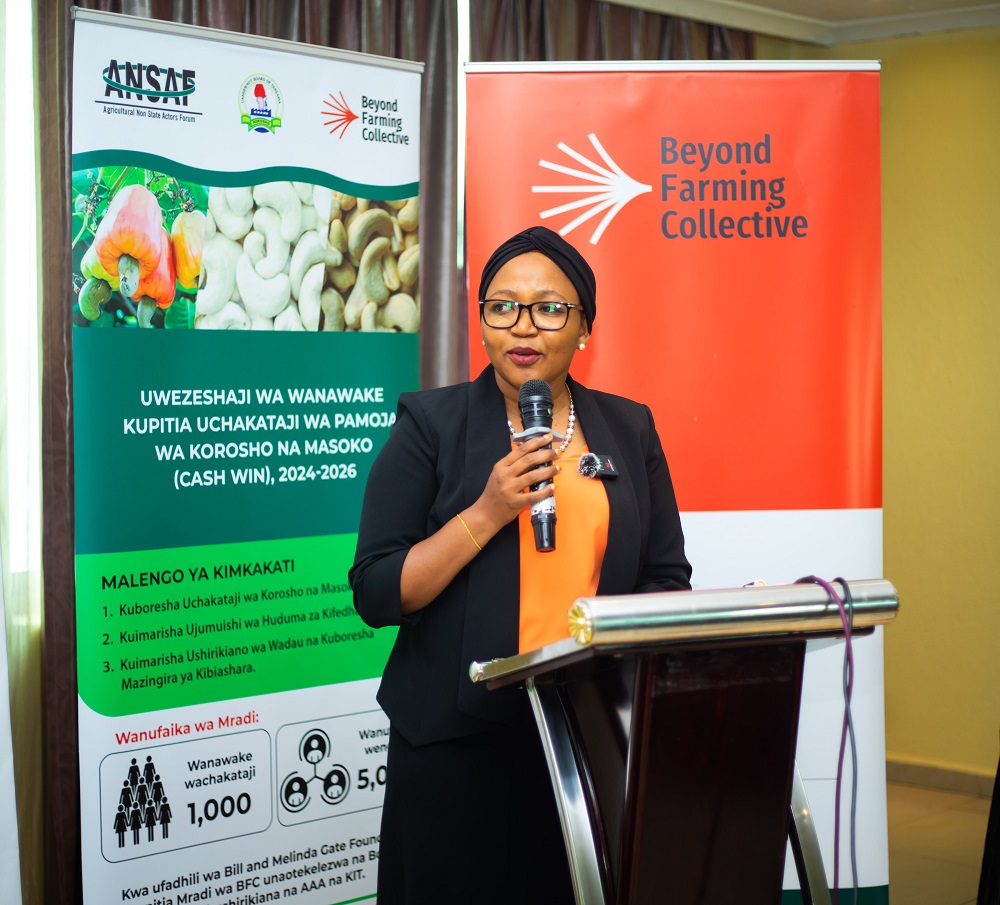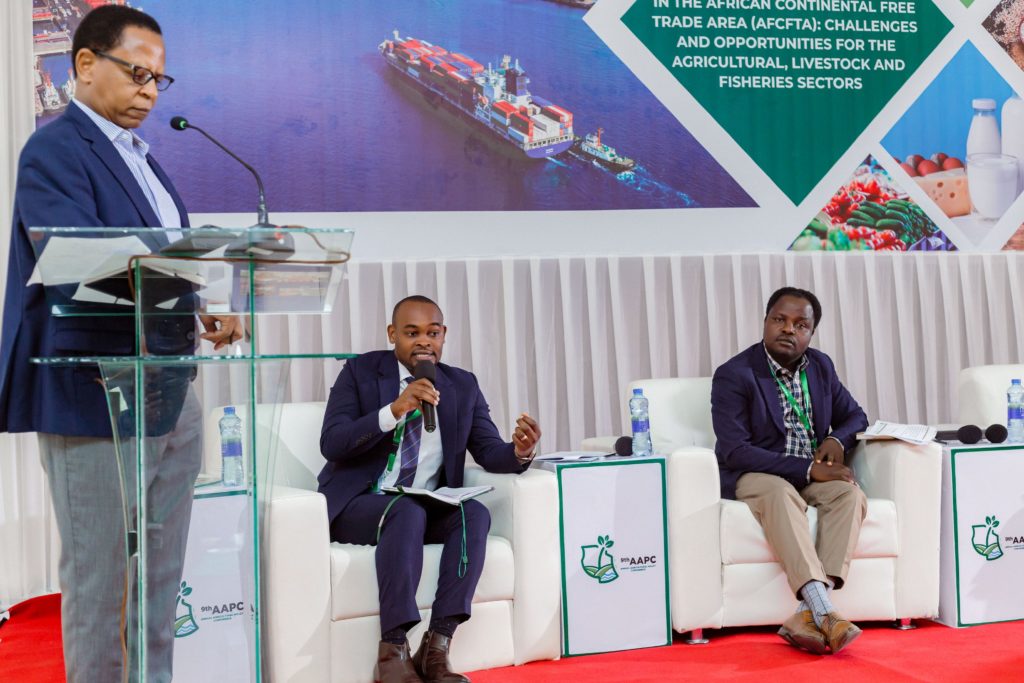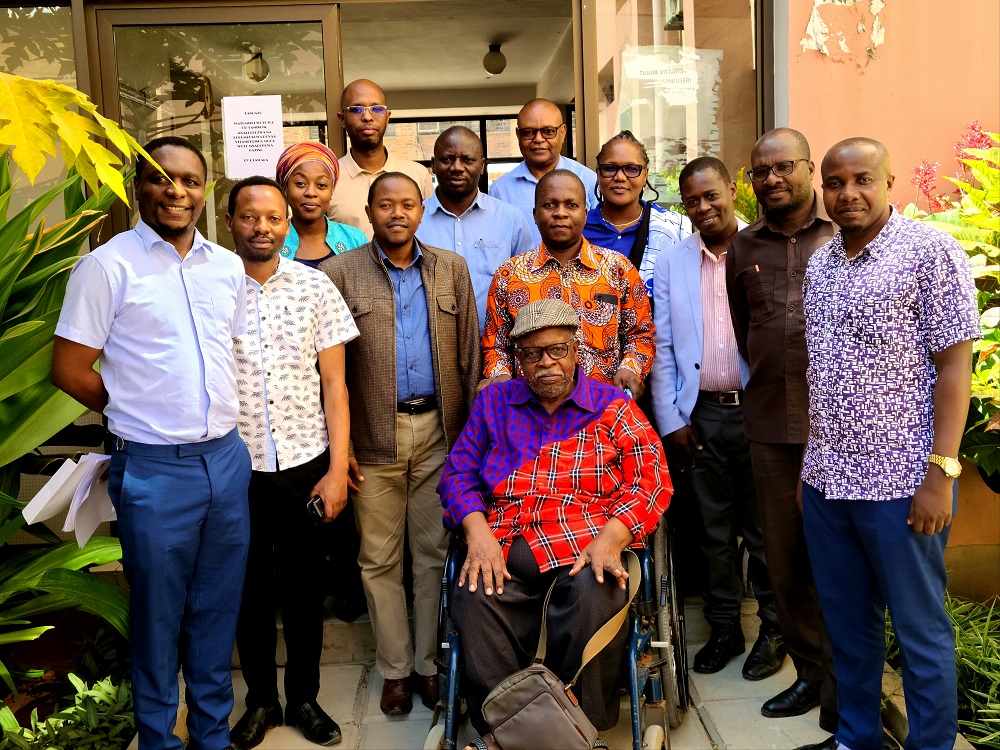Projects
"Women's Empowerment Through Collective Cashew Processing and Marketing for Improved Livelihoods in Southern Tanzania" (CASH WIN)
Funded by Bill and Melinda Gates Foundation through the Beyond Collective Farming Project, the CASHWIN project spans from 2024 to 2026 in key cashew-producing regions of Lindi and Mtwara. The project aims to contribute to the transformation of the cashew processing sector in Tanzania by strengthening cashew processing and marketing, promoting financial inclusion and digitized services, enhancing stakeholder collaboration and advocacy by fostering a supportive ecosystem to enhance the local processing capabilities of women cashew processors.
It is expected to directly benefit 1,000 women processors and indirectly impact an additional 5,000 stakeholders. ANSAF implements the project in collaboration with its members in the targeted areas, including WAKORU, Kitama Farmers Processors Association, and Tandahimba Farmers Association (TAFA), as well as other public institutions including the Cashew Board of Tanzania (CBT) and SIDO. Key activities include forming Farmer Processors Associations, providing Business Development Services (BDS) for capacity development, creating market linkages, advocating for an enabling business environment, and implementing quality assurance and sustainability practices.


Improved livelihoods of smallholder farmers through quality service delivery in the Agriculture Sector
ANSAF was supported by the Foundation for Civil Society (FCS) to lead the Agriculture Cluster Members (ACMs) which include other seven (7) CSOs namely Research and Organization (REDO), Shirika la Matumaini na Maendeleo Kanyigo (SMMK), Chama cha Wasiioona Mkoa wa Shinyanga (CWMS), Tanzania Wote Equality Alliance (TAWEA), Foundation for Development Org (FODEO), Mushrooming Legal Economics and Environment Aid for Communities (MLEEACO) and Tanzania Home Economics Organization (TAHEA), in implementation of the project in Singida, Kagera, Shinyanga, Simiyu, Tabora, and Mwanza.
ANSAF was seeking to achieve Improved service delivery in the agriculture sector through citizen participation in decision making processes and, increased transparency and accountability in the use of public resources using the FCS’s Cluster Approach. Hence the project intervention focused on strengthening the capacity of the civil society organizations and citizens to influence transparency and accountability in the use of public resources, facilitating evidence generation for informing decision makers and duty bearers and influencing the government response to citizens’ voices on issues related to inclusive planning processes, accountability, and transparency. As the cluster leader, ANSAF facilitated capacity building for ACMs to implement Social Accountability Monitoring (SAM) and Public Expenditure Tracking Surveys (PETS), conduct national and LGAs budget analysis, and document SAM/PETS case studies for dissemination and share with policy/decision makers and other stakeholders.
Agroforestry for Livelihood Empowerment (ALIVE)-Policy engagement component
With support from VI Agroforestry through ALIVE programme, ANSAF has been leading advocacy and supporting capacity building of the project core partners in formation and managing advocacy networks, use of evidence-based advocacy when engaging with policy and decision makers and how to use media for advocacy, learning and information sharing and Facilitating advocacy forums at national level. ANSAF interventions has achieved to engage duty bearers on various levels to influence long-term structural changes in society with regards to sustainable agriculture, agroforestry, climate change and equal rights for women and men on rights to land and other productive resources.


Smallholder Coffee Development Project in Tanzania's Southern Highlands – CODE-P
With support from European Union Commission, the project is implemented in collaboration with Vi Agroforestry, BRAC Maendeleo, Café Africa and Tanzania Coffee Research Institute (TaCRI). The project aims at contributing to an inclusive and sustainable development of the coffee value chain for better incomes and improved nutrition of 24,000 smallholder farmers in Southern Tanzania. ANSAF is leading implementation of outcome dubbed “Enhanced competitiveness of the coffee value chain with supportive policy and regulatory framework (through Coffee smallholder farmers Development Programme (CODE-P)”. Under this outcome ANSAF is strengthening platforms for dialogue among coffee value chain actors at local, zonal and national level and; leading evidence-based advocacy for improved business in coffee value chain. In addition to these ANSAF is also organizing radio campaigns to enhance nutrition sensitive agriculture in the project areas.
Strengthening Management and Governance of the Women, Youths and People with Disabilities Empowerment Fund in Tanzania Project
A two-year (2021-2023) project with financial support from the Finnish Embassy to address challenges related to management and governance of the 10% Local Government Authorities (LGAs) loans revealed from ANSAF 2019 study which focused to assess the capacity of 25 LGAs in allocating and disbursing 10% of its own source of revenue as interest free loans to Women, Youth and Persons with Disabilities (WYPWD) per the Local Government Finance Act. The aim was to enhance the effectiveness and performance of the fund and therefore maximize its potential for job creation, improving incomes, and enhancing gender equality hence contributing to improved livelihoods of women, youths, and persons with disabilities.
Project interventions focused on strengthening capacities of LGA officials, beneficiaries and oversight bodies, creating awareness on loan availability and accessibility procedures, influencing LGAs to allocate 10% of revenues from own sources to the fund, and establishing a linkage between intended beneficiaries with relevant service providers within their respective districts.


Enhancing Agroecology Friendly Policies and Practice Project
A project funded by the McKnight Foundation through Collaborative Crop Research Programme (CCRP). Under this project, ANSAF has been advocating for inclusive and friendly agroecology policies and practices that empowers smallholder farmers to practice market-led and sustainable agriculture. It aimed at enhancing agroecology transformation for sustainable use of natural resources and smallholder producers’ resilience for sustainable food systems, industrializationprocess and economic growth in Tanzania. The project facilitated evidence generation through policy and budget analysis to influence informed decision making; Facilitated media campaign and; Strengthened national and zonal level agroecology multi-stakeholders’ platforms in Southern highlands, Lake zone and Central zone for dialogues, coordination, advocacy, and learning.
About Us
We are passionate about agricultural development. Through our unwavering commitment, we empower smallholder producers, fostering sustainable practices, and driving positive change in farming communities.
